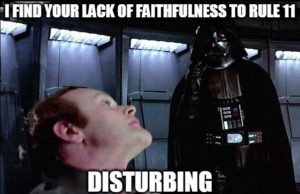Today in United States v. Pattee, the Second Circuit (Calabresi, Lynch, Lohier, CJJ.) found it “disturbing that district courts do not routinely follow the minimal procedures put in place to protect defendants’ rights.”
In accepting a guilty plea to producing, distributing and possessing child pornography, the district court (Geraci, Ch.J.) failed to advise the defendant of “five of the approximately fifteen rights” listed in Federal Rule of Criminal Procedure 11. The Circuit found this troubling, as the “Court has stated time and again that [w]e have adopted a standard of strict adherence to Rule 11” and that “compliance with Rule 11 is not a difficult task” because “errors can be avoided if a district or magistrate judge has a standard script for accepting guilty pleas. . . . Yet failures to meet those requirements are a recurring issue.” The Court further cautioned that “even strict adherence to Rule 11 may not cover every issue that may be relevant to assessing a particular defendant’s understanding.” Thus, “district and magistrate judges must be alert to ways to go beyond rote recitals, in order to make sure that the defendant’s waiver of rights is truly knowing and voluntary.”
“In the instant case,” however, “Pattee made no objection to the district court’s compliance with Rule 11,” so the Court reviewed his “claims of defective compliance under the plain error standard.” The Court found Pattee failed to satisfy the third prong of this test — prejudice to substantial rights — because he failed to show “a reasonable probability that, but for the error, he would not have entered the plea.”
Lastly on this point, the Court noted that Pattee had filed a suppression motion the judge ultimately denied and that, by pleading guilty without an agreement preserving that issue, Pattee was waiving his right to appeal the suppression issue. The Court said “it would serve the interests of justice, and also the prudential purpose of creating a record that would either expose erroneous advice by counsel before a plea is entered or refute later false claims of such advice, if district and magistrate judges included advice about the effect of a guilty plea on appeal rights in their standard colloquy for guilty plea proceedings, particularly in cases in which the outcome of a suppression motion is largely determinative of the defendant’s prospects at trial.”
The Court next joined the First and Seventh Circuits in rejecting a “narrow” reading of the child-pornography production statute: the argument that there must be proof the equipment used to create the material — i.e., the camera — traveled in interstate commerce. The Court disagreed, finding it sufficient that Pattee admitted “the pornography was stored on hard drives that had traveled in interstate commerce.” Put simply, “production encompasses more than the device used to capture the image or video.” “It does not follow from this conclusion, however, that merely transferring or copying a pornographic image that was produced by someone else is tantamount to ‘producing’ child pornography, such that simple possession, which typically involves making a copy of a file to a hard disk or other medium, would qualify as production.” Production does not cover “one who possesses copies of child pornography created by someone else.”
Turning to Pattee’s sentence — 47 years — the Court found no procedural errors and, in one paragraph, rejected the argument that this “sentence that effectively amounts to life in prison” is substantively unreasonable.
Finally, the Court left the door open to Pattee filing a motion under 28 U.S.C. § 2255. Pattee claimed “his retained counsel told him that he could plead guilty and still appeal the suppression motion that had been denied, and upon which his case depended. If Pattee’s counsel did tell him that, the advice was incorrect . . . . This alleged error by retained counsel suggests a possible ineffective assistance of counsel claim.”

